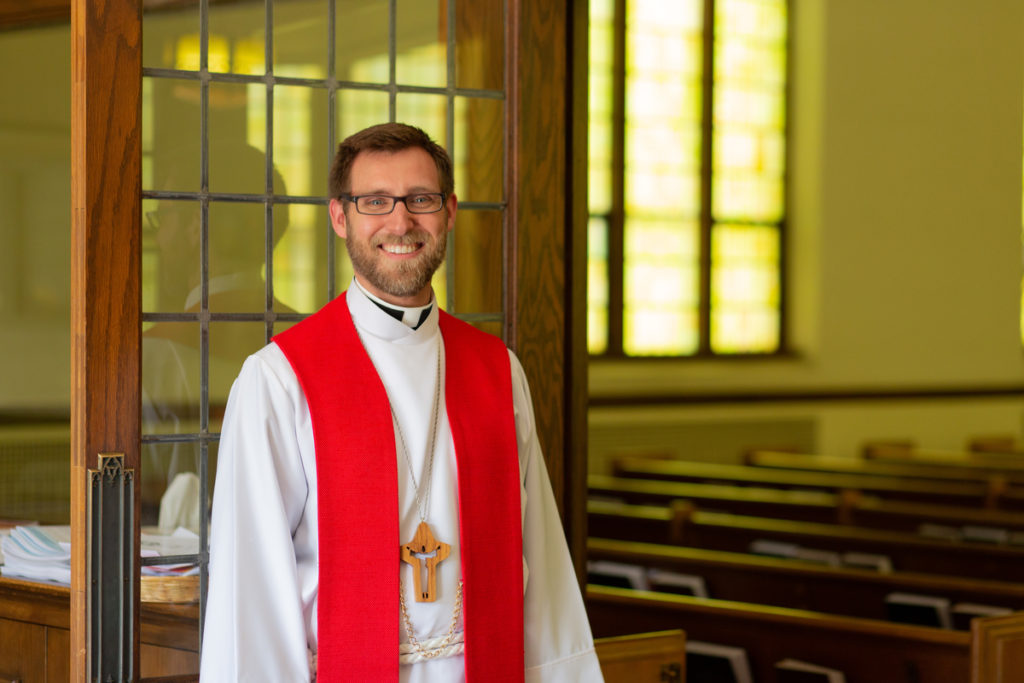
When John heard in prison what the Messiah was doing, he sent word by his disciples and said to him, “Are you the one who is to come, or are we to wait for another?” Jesus answered them, “Go and tell John what you hear and see: the blind receive their sight, the lame walk, the lepers are cleansed, the deaf hear, the dead are raised, and the poor have good news brought to them. And blessed is anyone who takes no offense at me.” (Matthew 11:2-6 NRSV)
There goes the Son …

Evangelical Lutheran Worship
These days, there are many who are offended by the God revealed in Jesus Christ and in the Holy Scriptures. The primary offense is caused by the name Father, Son and Holy Spirit. Others take offense at the masculine pronouns that the Bible uses for God. As a result, the Evangelical Lutheran Church in America, in its hymnal Evangelical Lutheran Worship, worked diligently to reduce the use of masculine pronouns to refer to God. This was particularly true in the translation of the Psalms. In addition, they provided an alternate invocation for the beginning of the liturgy that enabled congregations to avoid saying Father and Son. Many of the Prayers of the Day and all of the Proper Prefaces, were changed so that prayer was addressed to God in general rather than to the Father. Over the years, Sundays and Seasons, the electronic worship resource from Augsburg Fortress, has offered a variety of alternatives for those who are so offended. Finally, at the 2019 Churchwide Assembly, a social statement was passed calling for an even greater use of “gender-inclusive and expansive language for God.”
The Trinity
The Augsburg Confession, on the other hand, affirms the doctrine of the Trinity in the strongest terms, saying:
We unanimously hold and teach, in accordance with the decree of the Council of Nicaea,’ that there is one divine essence, which is called and which is truly God, and that there are three persons in this one divine essence, equal in power and alike eternal: God the Father, God the Son, God the Holy Spirit.[1][emphasis mine]
What’s at Stake?
So what is at stake? Is this just quibbling over words? Are we as Lutherans bound to the language used in the Augsburg Confession? Will it really make a difference if we use expansive language for God?
The answer is, “Yes!” What was at stake at the Council of Nicaea was far more than a quibble over words. The Council was not engaged in an esoteric debate about a doctrine that few lay people would ever understand. What was at stake was the Incarnation itself. Is the Son divine, or only the Father? Was God truly incarnate in Jesus of Nazareth, or did it only appear to be the case? It was the position of the orthodox that the Gospel and salvation itself were on the line. Rejection of the Incarnation was a rejection of the Gospel. The Lutheran reformers would have agreed.
The Gospel
Why is the Gospel at stake? To explain this, let me introduce a couple of terms with which you may not be familiar. The terms are general revelation and particular revelation.[2] General revelation refers to the knowledge of God that is available to all people. Romans 1:20 says:
Ever since the creation of the world his eternal power and divine nature, invisible though they are, have been understood and seen through the things he has made. (NRSV)
Some knowledge of God is available to all people. For instance, through the use of reason we can come to know that God is omniscient, omnipotent, and omnipresent. If we look at nature, at the beauty and precision that it contains, we can catch a glimpse of the Creator. If we pay attention to the moral law that is written in our hearts, we know that God is holy and righteous. Some of us have even felt God’s presence in our lives. Reason, nature, the moral law, and our feelings can give us some idea of what God is like.
What none of them can do, however, is enable us to know that God is a gracious God. Knowing that God is omniscient, omnipotent, and omnipresent doesn’t tell me whether God cares about me. What nature reveals about God is too ambiguous to tell me whether he is good. For every beautiful sunset, perfect snowflake and cuddly puppy, there is a hurricane, earthquake or an incurable disease. The moral law tells me that God is holy, but it doesn’t tell me whether God is merciful to sinners like me. My feelings about God are ambiguous as well. One minute I may have a sense of God’s love and peace, but another moment I feel abandoned or condemned by God. General revelation can take us no further. Luther says:
I answer that there are two ways of knowing God. One is general, the other particular. Everyone has a general knowledge—that is, that there is a God that created heaven and earth, that He is righteous, and that He punishes the wicked. However, regarding what God thinks about us (His will toward us), what He will give or do to deliver us from sin and death, and how to be saved (for certain, this is the true knowledge of God), they don’t know any of this. In the same way, I may know someone by sight but not thoroughly because I don’t fully understand that person’s feelings toward me; that is how people by nature know there is a God. But what is His will and what is not His will, they have no idea![3]
The God We Meet in Jesus Christ
Particular revelation, on the other hand, which refers to God incarnate, Jesus Christ, does. When we encounter God in the baby in the manger and the man on the Cross, then we do know that we have a gracious God. It is the God we meet in Jesus Christ who enables us to have faith, to trust that we are loved and forgiven. Again, Luther says:
Christ is the only means, and as you might say, the mirror in which we can see God and by whom we can also know His will, for in Christ, we see that God is no cruel and demanding judge but a Father of extremely goodwill, loving and merciful. In order to bless us—that is, to deliver us from the law, sin, death, all evil, and to grant us grace, righteousness, and eternal life—He “did not spare his own Son, but gave him up for us all.” This is the true knowledge of God, the divine persuasion that does not deceive us but paints us a trustworthy picture of God, other than this there is no God.[4]
Offended by the Incarnation
This is why traditional Lutherans are alarmed by the call for more “gender-inclusive and expansive language for God.” It is not because we oppose inclusive language in general, as is often alleged, or that we want to subordinate women to men. Something more is at stake. When we are offended by the very words that Jesus used to name God, when we are offended by his masculinity, as in the past some were offended by his Jewishness, when we are offended by the claim that Jesus is the way, the truth and the life, we are offended by the Incarnation itself. In that case, we are offended by the only thing that makes it possible for us to know and trust that we have a gracious God. The Gospel, justification by faith, and salvation itself, are at stake. Instead of being offended, we give thanks, as we do in the proper preface for Christmas:
In the wonder and mystery of the Word made flesh you have opened the eyes of faith to a new and radiant vision of your glory: that beholding the God made visible, we may be drawn to love the God whom we cannot see.[5]
[1] Theodore G. Tappert. Augsburg Confession (Kindle Locations 58-59). Kindle Edition.
[2] Luther, Martin. Martin Luther’s Commentary on St. Paul’s Epistle to the Galatians (1535): Lecture Notes Transcribed by Students and Presented in Today’s English (p. 350). 1517 Publishing. Kindle Edition.
[3] Ibid., p. 350.
[4] Ibid., pp. 346-347.
[5] Lutheran Book of Worship: Ministers Desk Edition. 1978 Augsburg Fortress, p. 209.



























Pr. Charlton’s voice is much needed in the urgency to clarify the glaring differences between the dominant theological heterodoxy coming from the ELCA and the grounded orthodox position of early Christianity. The reasons that the church throughout its nascent ascendency had to make urgent distinction between the unique Gospel of the New Testament and opposed to both Judaism as well as more subtle heresies from other corners of the known world was to maintain the basic and necessary sufficiency that the New Testament Gospel offers. Certainly definition of terms as well as clarification of the nature and persons of the Triune God was an essential part of the early church’s mission within public society. The development of Christian dogma and the teaching of it had to keep its eye on terminology as well as the cultural context in which this terminology would be expressed in public worship.
In much of the current public teaching and witness by the ELCA it will be necessary for all clergy to take up the task of clarification by engaging heterodox teaching (in this case the wrongful use of sociological meaning to terms such as “father” “son”, and pronounal language to the detriment of the unique qualification expressed in the theological and biblical use of these terms.) to draw out the distinctive and unique nature of who God the Father is in relation to who Christ is as the only-begotten Son but also for us as those who share in the once-for-all-time reconciliation brought on by the cross. The Father and the Son are charged with our being reconciled with them and with one another and so we should keep in mind that this Father is not finally akin as a general father-son relationship in all its parts. The unique quality of the persons of the Trinity can not ultimately be compared to the common bonds which we share within the natural orders of family. But perhaps we can begin with how the catechism is taught and how Luther spells out who the Triune God is in the meanings attached to the three articles of the creed.
I am pleased to see Lutheran Core taking the helm in this type of mission for biblical and theological clarity in opposition to a seemingly rampant and careless application of terminological redaction by the ELCA in much of its public teaching.